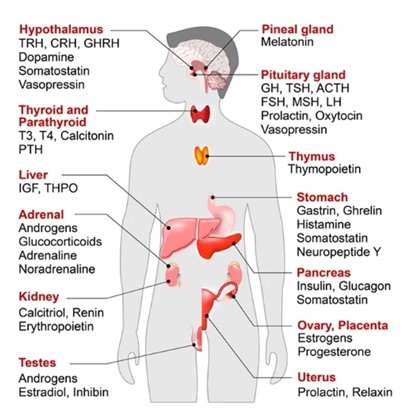Although optimism is primarily a mental attitude and psychological state, it can have some physical effects, such as hormonal changes. A person may experience the following hormonal changes when optimistic:
Endorphin Release:
Optimism and positive thinking can stimulate the release of endorphins, which are known as “feel-good” hormones. Endorphins aid in the easing of pain and foster feelings of happiness and well-being. When someone has a positive outlook, endorphins are released, resulting in feelings of happiness and contentment.
Stress Hormone Reduction:
Optimism can assist manage the release of stress hormones like cortisol and adrenaline. Those who retain an optimistic mentality are more likely to cope with stress efficiently and see obstacles as manageable. This optimistic attitude assists to lower the synthesis of stress hormones, resulting in less anxiety and tension.
Oxytocin Levels Increased:
Oxytocin, sometimes also known as the “love hormone” or “bonding hormone,” is linked to social bonding, trust, and pleasant social interactions. Those that are optimistic tend to have greater social ties and form deeper partnerships. Positive social interactions can cause the production of oxytocin, which promotes emotions of intimacy, empathy, and connection.
Serotonin Boost:
A neurotransmitter called serotonin also has a significant impact on mood, appetite, and sleep regulation. Higher serotonin levels have been related to optimism and positive thinking. Those who keep a positive attitude may also experience a rise in serotonin, which leads to enhanced mood and general well-being.
Immune System Regulation:
According to research, optimism and happy emotions can also significantly impact immune system function. Immune function may improve in optimistic people, including higher antibody production and a better immunological response to infections. This can also lead to improved general health and a lower risk of certain illnesses.
Dopamine Release:
Dopamine, a neurotransmitter associated with pleasure, motivation, and reward, stimulates by optimism and optimistic thinking. Those with an optimistic mentality may also experience a boost in dopamine levels, which leads to emotions of drive, excitement, and accomplishment.
Increased Brain Neuroplasticity:
Optimism can also influence the brain’s neuroplasticity, or its ability to alter and adapt. According to research, happy emotions and an optimistic attitude can boost neuroplasticity, resulting in better cognitive function, memory, and learning capacities.
Regulation of Sleep Hormones:
Similarly, optimism and good thoughts can help regulate sleep chemicals like melatonin. Those who keep a positive outlook and reduce stress may enjoy higher sleep quality and more regulated sleep-wake cycles, which can have a favorable influence on general health and well-being.
Thyroid Hormone Balancing:
Optimism and good emotions are also related to improved thyroid function. The thyroid gland is responsible for controlling metabolism, energy levels, and mood. Those who keep a positive attitude may promote optimum thyroid function, resulting in increased energy, emotional stability, and also general well-being.
Lower Blood Pressure:
It has also been discovered that being optimistic is correlated with lower blood pressure levels. The rise in blood pressure increases the risk of cardiovascular issues. Persistent stress and bad emotions can also contribute to this. Contrarily, optimism encourages rest, stress reduction, and cardiovascular health, which results in lower blood pressure readings.
It’s crucial to remember that, while optimism might affect hormone changes, the results can differ from person to person. Hormone responses affect extrinsic variables such as heredity, overall health, and environmental influences. Furthermore, the link between optimism and hormone changes is a complicated topic that requires more research to properly comprehend the underlying mechanisms.
Nevertheless, adopting an optimistic mentality has numerous mental, psychological, and physical health advantages. Optimism may result in a healthier attitude toward life, better-coping methods, and better overall health.
For more interesting topics, visit blogtoeducate.com






